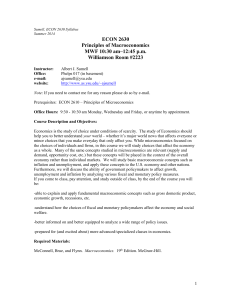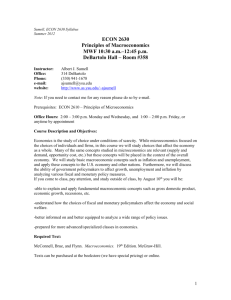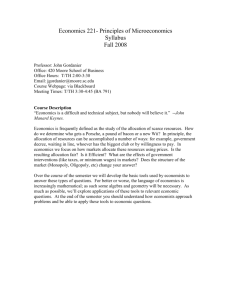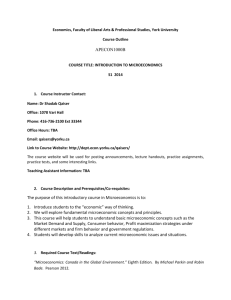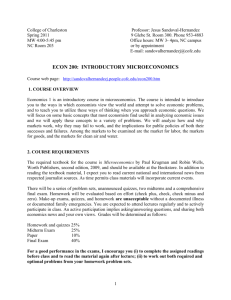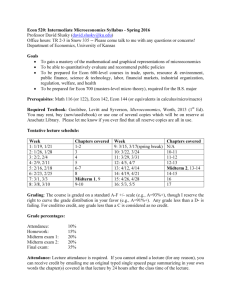Syllabus
advertisement
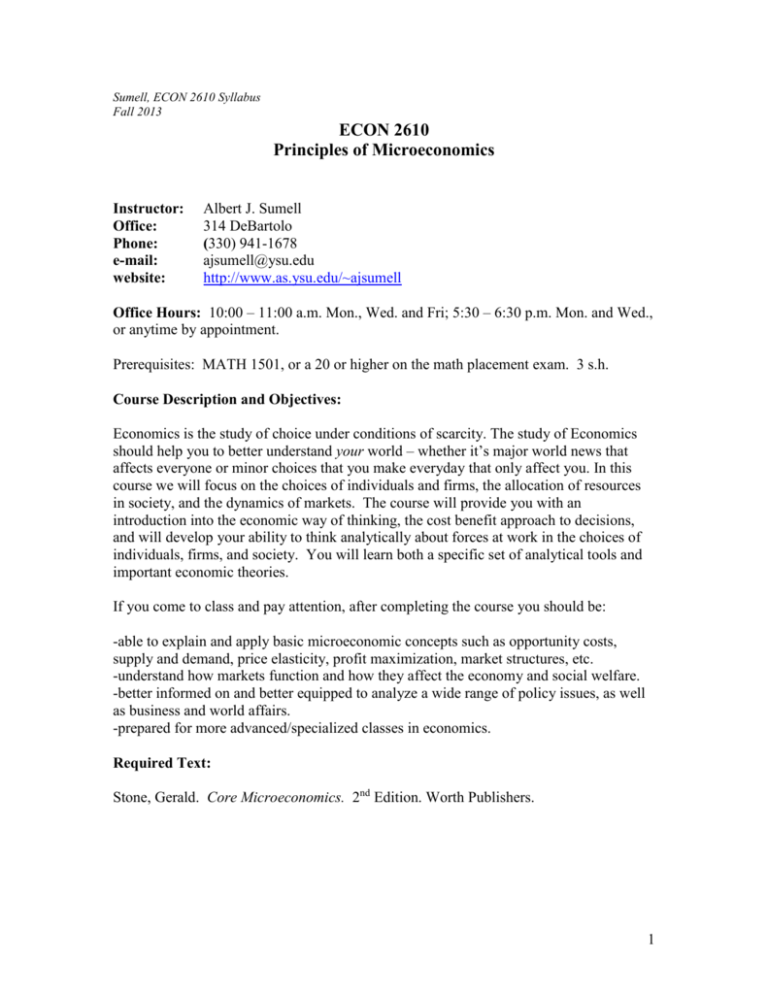
Sumell, ECON 2610 Syllabus Fall 2013 ECON 2610 Principles of Microeconomics Instructor: Office: Phone: e-mail: website: Albert J. Sumell 314 DeBartolo (330) 941-1678 ajsumell@ysu.edu http://www.as.ysu.edu/~ajsumell Office Hours: 10:00 – 11:00 a.m. Mon., Wed. and Fri; 5:30 – 6:30 p.m. Mon. and Wed., or anytime by appointment. Prerequisites: MATH 1501, or a 20 or higher on the math placement exam. 3 s.h. Course Description and Objectives: Economics is the study of choice under conditions of scarcity. The study of Economics should help you to better understand your world – whether it’s major world news that affects everyone or minor choices that you make everyday that only affect you. In this course we will focus on the choices of individuals and firms, the allocation of resources in society, and the dynamics of markets. The course will provide you with an introduction into the economic way of thinking, the cost benefit approach to decisions, and will develop your ability to think analytically about forces at work in the choices of individuals, firms, and society. You will learn both a specific set of analytical tools and important economic theories. If you come to class and pay attention, after completing the course you should be: -able to explain and apply basic microeconomic concepts such as opportunity costs, supply and demand, price elasticity, profit maximization, market structures, etc. -understand how markets function and how they affect the economy and social welfare. -better informed on and better equipped to analyze a wide range of policy issues, as well as business and world affairs. -prepared for more advanced/specialized classes in economics. Required Text: Stone, Gerald. Core Microeconomics. 2nd Edition. Worth Publishers. 1 Basis for grading: - Quizzes/Assignments: 15% - Attendance/Participation: 5% - 1st Midterm: 25% - 2nd Midterm: 25% - Final Exam: 30% There will be two midterm exams. The exams will be in-class, and I hope to spend a portion of the class before the exam reviewing concepts that you will be asked on the exam. Exam makeups will be given before the final exam only for valid reasons (sleeping, forgetting and/or “not knowing” are not valid reasons). If you miss an exam, you must contact me within 24 hours of the exam either via e-mail or phone to have any possibility of being given a make-up exam. Study guides with practice questions will also be posted on the class website prior to each midterm. The final exam will be comprehensive, but will focus on the material after the last midterm. There will be approximately 10 quizzes which will be given approximately every non-exam class in the beginning of class and will last 10-15 minutes. If you miss a quiz you will receive a zero, regardless of the reason. There are no make-up quizzes, no exceptions. Your lowest quiz grade will be dropped at the end of semester, such that missing one quiz will not directly impact your grade. There will be approximately 3 assignments, each which will be posted on my website at least 2 days before it is due. The primary purpose of the quizzes and assignments is to ensure you are keeping up with the material covered and are prepared for the exams. Attendance is not mandatory, in that I will not directly subtract points from your grade if you miss class. However, consistent attendance is the single most important requirement to doing well in the class. There will be at least 5 “random” attendance days which will be used to determine your attendance/participation grade. There will be only one opportunity for extra credit. The extra credit assignment is to analyze a relevant Microeconomic article from a newspaper or magazine. This involves writing a summary of the article, including a discussion of the issue(s) the article addresses, relevance, policy implications, and a section in which you try and tie the article with class material and economic theory. Please see me outside of class if you would like a suggestion on possible topics. The analysis should be no more than 2 pages and will be worth a maximum of 10 points towards your final exam grade. Rules: NO CHEATING on exams or quizzes. I take this very seriously. If you are caught cheating in anyway (such copying from another student’s exam, using a cheat sheet, texting etc.) you will be given an F for the course and a report will be filed with Student Affairs. Refer to YSU’s Undergraduate Bulletin for University procedures and policies regarding academic misconduct. You are expected to conduct yourself in class in such a way that will not detract from other students’ ability to pay attention in anyway. This includes no loud talking or cell phone usage (including texting). You are responsible for all work missed during class regardless of the reason. If possible, it is best to make a copy of another student’s lecture notes from any missed class. You should also check the class website to see if a new assignment or study guide has been posted. If you must leave class early please let me know before class begins. 2 Final grades for the course will be based on the following scale: Grading Scale 90-100% 80-89% 70-79% 60-69% Below 60% A B C D F Final Grades may be curved as deemed appropriate at the end of the semester. Statement Regarding Disabilities: In accordance with University procedures, if you have a documented disability and require accommodations to obtain equal access in this course, please contact me privately to discuss your specific needs. You must be registered with the Center for Student Progress Disability Services, located at 275 Fifth Avenue, and provide a letter of accommodation to verify your eligibility. You can reach CSP Disability Services at 330941-1372. Preliminary Schedule (Subject to Changes): 8/21 – 8/28: 8/30 - 9/6: 9/9 – 9/13: 9/16 – 9/20: 9/23 - 9/27: 9/30 – 10/4: Chapter 1: Intro / Fundamentals Chapter 2: Production/Comparative Advantage Chapter 3: Supply and Demand Chapter 4: Market Efficiency and Market Failure Chapter 5: Elasticity Wrap up / Midterm 1 10/7 – 10/11: Chapter 6: Consumer Choice/Utility 10/14 – 10/18: Chapter 7: Production and Cost 10/21 – 10/25: Chapter 8: Perfect Competition 10/28 - 11/1: Wrap up / Midterm 2 11/4 – 11/8: Chapter 9: Monopoly 11/13 – 11/20: (No class 11/11) Chapter 10: Oligopoly and Game Theory 11/22 – 12/6: (No class 11/27-11/29) Chapter 13-14: Externalities and Poverty Final Exam Week Begins Monday 12/09 Note: 10/26 is the last day to withdraw with a grade of “W” 3 ECON 2610 and General Education Economics 2610 counts towards the Social Science domain requirement of General Education. The goal for the Social Science domain is: “Students will demonstrate understanding of the development, diversity, and complexity of human behavior, institutions, and culture.” ECON 2610 achieves the goal by requiring students to meet the following two learning outcomes: Learning outcome: Students will demonstrate understanding of individual and social behavior. What factors determine the number of units of a good a consumer will purchase? How much output will a firm decide to produce? How will the independent decisions of buyers and sellers determine the price at which a good is sold? How will the profits earned by firms direct the flow of resources to producing what consumers want? When will markets fail to allocate resources efficiency? Through the discussion of these issues the course will give students a better understanding of individual economic actors and how their collective behavior determines the allocation of society’s resources. Learning outcome: Students will demonstrate an understanding of methodologies used in the social sciences. Economists analyze economic behavior by constructing models of how economic actors behave and then test those models using real-world data. For example, economic theory would predict that an increase in taxes on cigarettes would cause a larger decline in smoking among younger smokers (who generally have less income) than older smokers. Actual information on cigarette consumption after a tax increase could be used to support or refute the theory’s prediction. The most important objective of this class is to introduce you to how economists analyze behavior (to “think like an economist”). While this class will not involve statistical analysis of data, we will periodically discuss the results of studies designed to test predictions based on economic theory. 4
